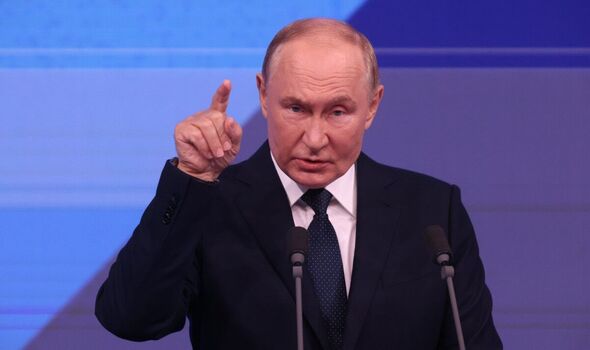World
Russia Ends Missile Treaty, Escalating Tensions with the West

The Kremlin has announced it will no longer adhere to the Intermediate-Range Nuclear Forces (INF) Treaty, escalating military tensions with the United States and its allies. This decision signals a significant shift in Russia’s military strategy, as it prepares to deploy short- and medium-range missiles without restriction, raising concerns about security in Europe.
In a statement released by the Russian state news agency TASS, a spokesperson for the Russian Foreign Ministry attributed this move to ongoing developments in US military strategy, particularly regarding missile deployments in Europe. The statement noted, “With our repeated warnings on that matter having gone ignored and the situation developing towards the de facto deployment of US-made intermediate-and shorter-range ground-based missiles in Europe and the Asia-Pacific region, the Russian Foreign Ministry has to declare that any conditions for the preservation of a unilateral moratorium on the deployment of similar arms no longer exist.”
Background of the INF Treaty
The INF Treaty was signed in 1987 by the US and Russia, prohibiting the deployment of ground-based and cruise missiles with ranges between 500 and 5,500 kilometers (approximately 310 to 3,400 miles). The treaty aimed to reduce the nuclear threat during the Cold War. However, tensions have resurfaced, particularly since Donald Trump announced the US withdrawal from the treaty in 2019.
With Russia’s withdrawal, the potential for missile deployments capable of reaching European targets, including the United Kingdom, has increased significantly. Moscow is located approximately 1,700 miles from London, within the range of medium-range missiles that could threaten European security.
Recent Developments and Military Movements
In conjunction with the treaty’s abrogation, Russian President Vladimir Putin has reportedly repositioned at least four Tu-95MS nuclear bombers closer to Europe. This action follows Trump’s announcement of repositioning two US nuclear submarines closer to Russia, intensifying the ongoing military standoff between the two nations.
Russian officials have expressed concerns about what they perceive as NATO provocations near their borders. Dmitry Peskov, a spokesperson for the Kremlin, stated that Russia reserves the right to deploy intermediate- and shorter-range missiles in response to these provocations. Additionally, Sergey Ryabkov, Russia’s Deputy Foreign Minister, indicated that the moratorium on missile deployment was nearing its end due to insufficient appreciation of Moscow’s restraint by the West.
As tensions continue to rise, reports have emerged suggesting that Russia’s foreign intelligence service, the SVR, may be attempting to orchestrate a “false flag” operation involving the UK. Such events typically entail a state orchestrating an attack on itself to blame another country, potentially using it as a pretext for military action.
According to reports cited by the Telegraph, the SVR has suggested that British intelligence services are planning to use NATO allies to launch a mass raid on what is termed the “shadow fleet,” a collection of Russian vessels trading resources while evading international sanctions. The report alleges that an ecological disaster in international waters is being prepared to facilitate this operation.
While some analysts interpret these developments as an effort by Russia to safeguard its maritime activities, others caution against the potential for miscalculation leading to a broader conflict. Dr. Sidharth Kaushal, a research fellow at the Royal United Services Institute, remarked, “One interpretation might be that the Russians are insuring themselves against something breaking down or sinking, in a way that creates a pretext for restricting their movement across the ocean.”
The situation remains fluid, with the potential for further escalation as both sides navigate this precarious landscape. The international community is closely monitoring developments as Russia’s decision to abandon the INF Treaty could have far-reaching implications for global security dynamics.
-

 Entertainment2 months ago
Entertainment2 months agoIconic 90s TV Show House Hits Market for £1.1 Million
-

 Lifestyle4 months ago
Lifestyle4 months agoMilk Bank Urges Mothers to Donate for Premature Babies’ Health
-

 Sports3 months ago
Sports3 months agoAlessia Russo Signs Long-Term Deal with Arsenal Ahead of WSL Season
-

 Lifestyle4 months ago
Lifestyle4 months agoShoppers Flock to Discounted Neck Pillow on Amazon for Travel Comfort
-

 Politics4 months ago
Politics4 months agoMuseums Body Critiques EHRC Proposals on Gender Facilities
-

 Business4 months ago
Business4 months agoTrump Visits Europe: Business, Politics, or Leisure?
-

 Lifestyle4 months ago
Lifestyle4 months agoJapanese Teen Sorato Shimizu Breaks U18 100m Record in 10 Seconds
-

 Politics4 months ago
Politics4 months agoCouple Shares Inspiring Love Story Defying Height Stereotypes
-

 World4 months ago
World4 months agoAnglian Water Raises Concerns Over Proposed AI Data Centre
-

 Sports4 months ago
Sports4 months agoBournemouth Dominates Everton with 3-0 Victory in Premier League Summer Series
-

 World4 months ago
World4 months agoWreckage of Missing Russian Passenger Plane Discovered in Flames
-

 Lifestyle4 months ago
Lifestyle4 months agoShoppers Rave About Roman’s £42 Midi Dress, Calling It ‘Elegant’









